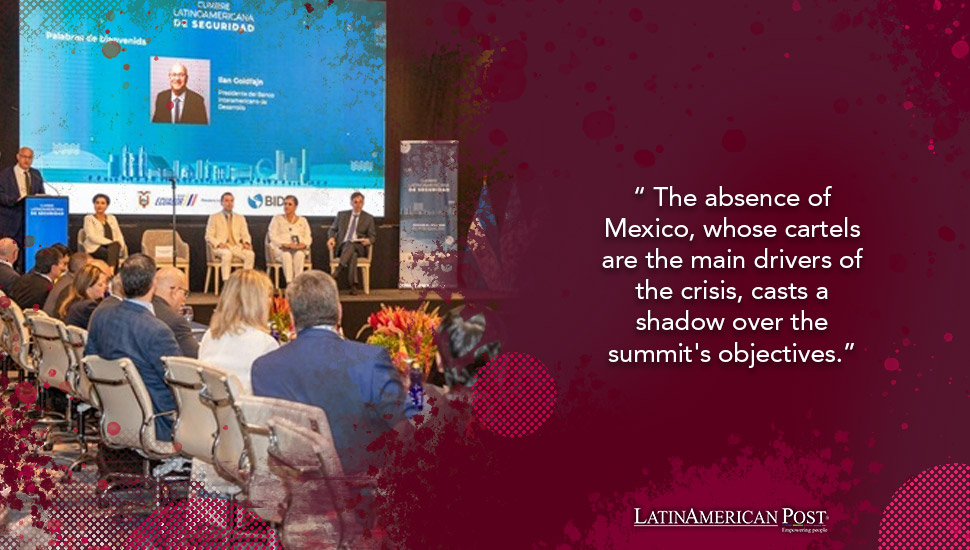Mexico’s Absence Undermines Latin America’s Fight Against Cartel Violence

As Latin American countries rally to combat the growing threat of cartel violence, Mexico, despite being the epicenter of the issue, failed to show up at a critical security summit. With cartel influence spreading across the region, Mexico’s absence is a missed opportunity that could have dire consequences for the entire area.
Mexico’s Diplomatic Snub at a Crucial Time
Latin America is in the grip of a crime wave unlike any it has seen before. Once primarily focused on drug trafficking, cartels have now branched out into illegal mining, human trafficking, extortion, and even street-level drug peddling. No longer content with territorial control in isolated pockets, these criminal organizations have evolved into sophisticated, multinational operations with far-reaching tentacles. They now dominate the illicit economies of multiple Latin American countries, creating what can only be described as a criminal empire spanning borders.
Despite this, Mexico—the country that has long been the epicenter of cartel violence—was conspicuously absent from the recent Latin American Security Summit in Guayaquil, Ecuador. The Inter-American Development Bank (BID) organized the summit to coordinate regional responses to the rise in organized crime. The absence of Mexico, whose cartels are the main drivers of the crisis, casts a shadow over the summit’s goals. The reason for this absence? A diplomatic spat with Ecuador.
Mexico’s failure to attend the summit is not just a political faux pas; it is a severe miscalculation that could jeopardize the collective efforts of Latin American countries to fight the growing cartel threat. Organized crime knows no borders, and Mexico’s cartels have become the most powerful criminal entities in the region. By not participating in this crucial gathering, Mexico missed a golden opportunity to lead the charge against the very cartels that it birthed and continues to struggle against.
A Regional Crisis Fueled by Mexican Cartels
Mexico’s absence is particularly troubling given that its cartels are responsible for much of the violence and instability plaguing the region. What began as a domestic issue in Mexico has now spread throughout Latin America, with Mexican cartels expanding their operations into Central and South America. These cartels control everything from drug trafficking routes to illegal mining and human trafficking networks, and their influence is felt from Guatemala to Colombia and beyond.
Countries like Guatemala, Honduras, and El Salvador have borne the brunt of this spillover violence. In these nations, Mexican cartels have become the dominant criminal organizations, operating with impunity in regions where state control is weak. As a result, violence has surged, leaving local governments scrambling to restore order. Without Mexico’s leadership in a regional security framework, efforts to curb cartel violence will be fragmented and far less practical.
Take Ecuador, for example. In recent years, the country has seen an alarming rise in violence linked directly to Mexican cartel operations. Once considered one of the safer countries in Latin America, Ecuador is now facing record-high homicide rates and widespread violence. Guayaquil, the city where the security summit was held, has become the epicenter of this violence, with daily reports of murders, kidnappings, and extortion linked to cartel activity.
Ecuador’s leaders have declared multiple states of emergency to regain control, but they know they cannot fight this war alone. The summit was their call for help—a chance for Latin American countries to unite against a common enemy. Yet the most crucial player in this fight, Mexico, chose not to participate, leaving a gaping hole in the regional strategy.
A Missed Opportunity for Collective Action
The security summit in Guayaquil was not just another diplomatic meeting. It was a critical moment for Latin American countries to pool their resources and develop a coordinated response to organized crime. The proposals on the table included the creation of a Security Alliance that would allow countries to share intelligence, mobilize resources, and implement joint strategies to combat cartels. Notably, the summit also focused on cutting off the financial flows that fuel these criminal enterprises—a vital step in dismantling their power.
But without Mexico’s participation, the summit’s impact is severely diminished. Mexican cartels are the largest and most powerful criminal organizations in the region. Any plan to combat organized crime in Latin America that does not include Mexico is incomplete and unlikely to succeed. Mexico’s absence sends a troubling message: that it is not fully committed to the regional fight against organized crime, even though its cartels are at the heart of the problem.
The cost of fighting organized crime is enormous. Latin American countries are already spending an estimated 3.5% of their GDP on efforts to combat cartels and gangs. These funds could be used to improve education, healthcare, and infrastructure—yet they are being diverted to address the growing threat of organized crime. Countries like Ecuador, Colombia, and Peru are bearing the brunt of these costs, and they desperately need Mexico’s involvement to spread the burden.
A Dangerous Distraction
So why was Mexico absent from such a critical meeting? The answer lies in a diplomatic dispute between Mexico and Ecuador that has soured relations between the two countries. Mexico has severed ties with Ecuador’s government over unrelated political issues, and this rift appears to have kept Mexico from participating in the summit. But this is more than just petty politics—it’s a dangerous distraction that could seriously affect the entire region.
By allowing a diplomatic spat to interfere with its participation in the security summit, Mexico has put the entire region’s efforts to combat organized crime at risk. The stakes are too high for countries to let political disagreements get in the way of collective action. The cartels are not waiting for Latin American countries to resolve their differences. They continue expanding, consolidating power, and exploiting the lack of coordinated action to strengthen their regional grip.
Mexico’s failure to show up is particularly egregious given that it is the country most responsible for the rise of cartel violence in Latin America. Its cartels are the driving force behind much of the violence and instability in the region, and Mexico has a responsibility to be at the forefront of the fight against them. By choosing to sit out the summit, Mexico has not only abdicated that responsibility but also undermined the efforts of its neighbors to address the crisis.
Latin America’s Inability to Work Together
The absence of Mexico at the Guayaquil summit highlights a broader problem facing Latin America: the region’s inability to work together to solve everyday challenges. In recent years, Latin American countries have dismantled the regional organizations that were created to tackle shared problems like poverty, inequality, and violence. Ideological differences, political egos, and intolerance have torn apart the alliances that once held the region together.
This fragmentation has had disastrous consequences. Latin American countries are now more divided than ever, and their inability to coordinate efforts against organized crime is becoming their biggest failure. The rise of cartels is not confined to one country—these criminal organizations operate across borders, and what happens in Mexico today can quickly spread to Colombia, Peru, or Brazil. Yet, instead of working together, Latin American countries are pursuing their own, often conflicting, strategies to combat the cartels.
If Latin America is to have any hope of defeating organized crime, it must come together as a region. Countries must set aside their political differences and work as a team to confront the growing threat of cartels. Mexico, as the country most affected by cartel violence, should be leading this effort—not standing on the sidelines.
In just a few years, Latin American countries have dismantled the regional organizations that once allowed them to tackle common problems. If they had maintained these alliances, the region would be in a much stronger position to fight the cartels today. Instead, political infighting and petty disputes have left Latin America vulnerable to the rising tide of violence.
Also read: Five Key Elements of Mexico’s Controversial Judicial Reform Proposal
It is time for Mexico and the rest of Latin America to recognize that the fight against organized crime cannot be won by any one country alone. Only through cooperation, coordination, and collective action can the region hope to turn the tide against the cartels. The Guayaquil summit was a step in the right direction, but without Mexico’s participation, it is incomplete. Latin America’s future depends on its ability to work together—and time is running out.





